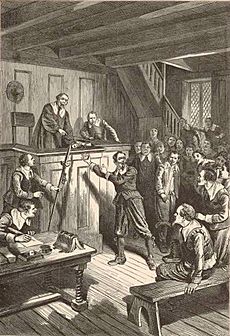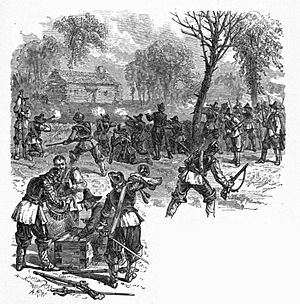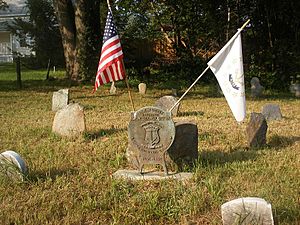Samuel Gorton facts for kids
Quick facts for kids
Samuel Gorton
|
|
|---|---|
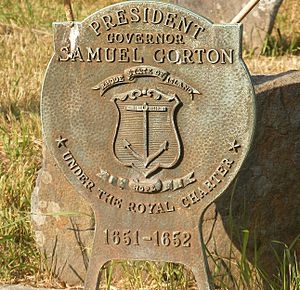
Samuel Gorton governor's medallion
|
|
| 5th President of Providence and Warwick | |
| In office 1651–1652 |
|
| Preceded by | Nicholas Easton (as President of all four towns of the Colony of Rhode Island and Providence Plantations) |
| Succeeded by | John Smith |
| Personal details | |
| Born | baptized 12 Feb 1592/3 Manchester, Lancashire, England |
| Died | by 10 December 1677 Warwick, Colony of Rhode Island and Providence Plantations |
| Resting place | Samuel Gorton Cemetery, Warwick, Rhode Island |
| Spouse | Mary Mayplett |
| Children | 9 |
| Education | Private tutors |
| Occupation | Clothier, assistant, president, commissioner, deputy |
| Signature |  |
Samuel Gorton (1593–1677) was an important early leader in the Colony of Rhode Island and Providence Plantations. He served as President of the towns of Providence and Warwick. Samuel Gorton had very strong religious beliefs. These beliefs were different from the common Puritan ideas of his time. He was also very open about his views. Because of this, he often had problems with leaders in the New England colonies.
Gorton was born in 1593 in Manchester, England. He learned languages and English law from private teachers. In 1637, he moved from England to America. He first settled in Plymouth Colony. However, he was soon forced to leave because of his religious ideas. He then moved to Portsmouth, where he faced similar issues. He was even whipped for not obeying the leaders. Next, he went to Providence Plantation. Here, he and a group of friends bought land from the Narragansett people. They named their new settlement Shawomet.
Gorton and his followers were later taken to Massachusetts. They were put on trial for their beliefs and writings. He was sent to prison in Charlestown. Many leaders wanted him to be put to death. After his release, Gorton went to England. He got an official order to protect his colony from the Earl of Warwick. When he returned, he renamed Shawomet to Warwick. This was to thank his English patron. He then became a leader in the government he once disagreed with. He served as an assistant, commissioner, deputy, and president.
Gorton wrote several books. He was a very smart and learned man. He strongly believed in God, the King, and the rights of individuals. He often criticized the leaders and ministers of his time. His beliefs brought him both followers and enemies. For a long time after his death, many people disliked him. But today, some historians see him as one of Rhode Island's great colonial leaders.
Contents
Samuel Gorton's Early Life
Samuel Gorton was born on February 12, 1593, in Manchester, England. His parents were Thomas and Anne Gorton. His family had lived in the Gorton area for a very long time.
Gorton was taught by private tutors. He became very good at languages and English law. He owned many books about old English laws. He was once called a "clothier," but he said he never did "servile employment" until he came to the colonies. His father was a successful merchant in London. This meant his family was financially well-off.
Samuel Gorton's Religious Ideas
Gorton's early life focused on religious ideas. He was inspired by the Puritan challenge to the Anglican Church. However, his ideas were not typical for Puritans. Many people thought his beliefs were very radical. Some of his religious teachers were John Saltmarsh, William Dell, and William Erbury. These men were also seen as having unusual religious views.
Gorton believed that the Holy Spirit was inside everyone. This meant every person had a divine spark. He thought that becoming religious meant following this inner divine feeling. This was more important than following human rules. Gorton felt that focusing on outer rules made people follow human laws instead of Christ's. His ideas were similar to the Seeker and Ranter groups. Later, the Quaker movement also shared some of these views. However, Gorton never officially joined these groups.
Because of his beliefs, Gorton was very suspicious of government rules. He believed all people were equal. He felt that church and government hierarchies were wrong. He thought that educated ministers were like the "Anti-Christ." He once wrote that his own call to preach was "not inferior to the call of any minister in the country."
Moving to Plymouth, Portsmouth, and Providence
Gorton was living in London in 1635. He decided to leave England for North America. He wanted to be free to worship God as he understood the Bible. One writer said Gorton valued freedom more than life itself. Gorton himself wrote, "I left my native country to enjoy liberty of conscience... and for no other end."
In March 1637, Gorton arrived in Boston with his wife and children. This was during a time of religious conflict called the Antinomian Controversy. He quickly felt the tension against people with different religious views. So, he did not stay long in Boston. He soon went to Plymouth Colony. He rented a house and helped during the Pequot War. But he soon had religious disagreements with his landlord. In December 1638, he was called to court. Gorton acted "mutinously" towards the leaders and ministers. He was told to leave the colony within 14 days.
Gorton left Plymouth, but his family stayed for the winter. He went to Portsmouth on Aquidneck Island. He arrived in late December 1638. In April 1639, he and 28 others signed an agreement. They declared themselves loyal to King Charles and formed a "civil body politick."
However, Gorton's problems continued in Portsmouth. In 1640, his servant caused trouble over a cow. Gorton refused to let her go to court. He went instead. He was hostile to the judges and was charged with 14 offenses. He was sentenced to be whipped. After this, he left Portsmouth for Providence Plantation.
Trouble followed Gorton to Providence. His ideas about church and government divided the town. On March 8, 1641, Roger Williams wrote about Gorton. He said Gorton was causing trouble in Providence with his "foul censures of all the ministers." Gorton was a strong debater. He gathered many unhappy settlers into a group called the Gortonists.
Gorton was never fully accepted in Providence. So, he moved again to an area called Pawtuxet. This was about five miles south of Providence.
Life in Pawtuxet and Warwick
In Pawtuxet, there was immediate conflict among the settlers. Most of them agreed with Gorton's views. But the original Pawtuxet settlers were upset by Gorton's behavior. These included William Arnold and his family. On November 17, 1641, these men wrote to Massachusetts. They complained about Gorton and his group. They asked Massachusetts for help. Since there was no formal government, these Pawtuxet settlers placed themselves under the control of the Massachusetts Bay Colony. This arrangement lasted for 16 years. This also led to a border conflict between Massachusetts and Rhode Island. The Arnolds helped Massachusetts try to remove Gorton and his followers.
In January 1643, Gorton and 11 others bought a large piece of land. It was south of Pawtuxet. They bought it from the Narragansett chief Miantonomi for 144 fathoms of wampum. They named the place Shawomet, using its Indian name. Here, the settlers felt safe from Massachusetts. They sent letters to Massachusetts that were very critical. These letters presented religious views that the Puritans disliked.
Gorton and the Shawomet men were called to the Boston court. Two minor Indian chiefs had complained about unfair land dealings. The Shawomet men refused to go. They said they were loyal to the King of England. They claimed they were outside Massachusetts's control. So, soldiers were sent after them. Their writings were taken, and the men were brought to Boston for trial.
The charges against Gorton were not about the land. They were about his letters, behavior, and religious views. He was charged with being "a blasphemous enemy of the true religion." He was ordered to be held in Charlestown. He had to work and wear chains to prevent escape. If he broke out or kept his "blasphemies," he could be sentenced to death. Most of the magistrates wanted the death penalty. But most of the deputies did not agree. Gorton and the others were released in March 1644. They were banned from both Massachusetts and Shawomet. They went to Aquidneck Island. There, they were welcomed by people who opposed Governor Coddington.
Journey to England
Gorton, Randall Holden, and John Greene sailed to England in 1644. Gorton spent four years there seeking justice. In 1646, he published a book called Simplicity's Defence Against Seven Headed Policy. It described the unfair treatment of the Shawomet settlers. Gorton achieved his goal. The Commissioner of Plantations ordered Massachusetts to let the Shawomet residents "freely and quietly live and plant."
Gorton stayed in England. Holden returned to America in 1646 and showed the order to Massachusetts. They did not accept it. New England sent former Plymouth governor Edward Winslow to England. He argued against Gorton. Winslow said Gorton's preaching offered "unconceivable political liberty." But Winslow's efforts failed. The English commission ruled in Gorton's favor.
Gorton continued to preach in England. He found many people who liked his religious views. He saw that ideas about religious tolerance were changing. He became an important part of the Puritan underground in London. He preached at Thomas Lamb's church, which was known for radical Puritan ideas. Gorton was described as sharing his "desperate opinions." He also spoke about how church rules and leaders were not important. He even preached at a meeting led by a woman. This showed he believed women had "spiritual and social equality," which was unusual for that time. This idea was later adopted by the Quakers.
Later Life and Legacy
Gorton returned to New England in May 1648. He landed in Boston. Massachusetts Bay leaders ordered his arrest. But he had a letter of protection from Robert Rich, 2nd Earl of Warwick. This kept him safe. To honor the Earl, he changed Shawomet's name to Warwick.
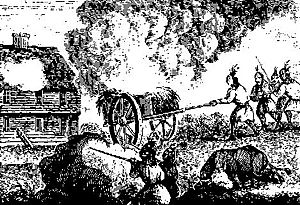
Gorton's views on government changed after his time in England. Now that Warwick was protected, he became active in government. The separate settlements of Providence, Portsmouth, Newport, and Warwick formed a government. They chose John Coggeshall as their first President in 1647. In 1649, Gorton was chosen as the Warwick assistant (magistrate). He and President John Smith initially declined their roles but eventually served.
In 1651, Gorton was chosen as President of the colony. However, William Coddington had gained control of the island towns. So, Gorton only led Providence and Warwick. In 1652, Smith became president again, and Gorton was the assistant. During this time, a law was passed to free slaves. Gorton likely helped write this law.
After his time as a magistrate, Gorton remained active in Warwick's government. He served as a commissioner many times between 1651 and 1663. His name is on a list of Warwick freemen in 1655. He was also one of the important citizens named in Rhode Island's Royal Charter of 1663. He was a Deputy to the General Assembly for four years in the late 1660s. He last served in public office in 1670, when he was 78 years old.
In 1675, Gorton heard that Native Americans in Connecticut planned to invade the Narragansett country. Later that year, King Philip's War began. Rhode Island did not start the war, but it suffered greatly. The people of Warwick had to leave their homes. They returned in the spring of 1677 to rebuild.
Gorton did not leave a will. But he gave his property to his heirs on November 27, 1677. He called himself "professor of the mysteries of Christ." He died by December 10, 1677. The exact date of his death is not known. He is buried in the Samuel Gorton Cemetery in Warwick. His grave has a governor's medallion and an unmarked stone.
Samuel Gorton's Beliefs and Impact
Samuel Gorton left a comfortable life in England for religious freedom in America. He was a strong individualist. He believed in three main powers: God, the King, and himself as an individual. He felt no other authority existed between these. The freedom of an individual was limited only by God's or the King's will. He and his followers believed that by connecting with Christ, people shared in God's perfection. They also thought that Heaven and Hell were states of mind, not physical places.
Gorton and his followers faced punishment for their beliefs. They were imprisoned, whipped, forced to work hard, and banished. Their property was taken. Some of the ideas they taught were:
- Heaven and hell are feelings in people's hearts, not physical places after death.
- Baptizing babies does not save their souls. Babies cannot understand or accept Christian ideas.
- Ministers and leaders should not be the only ones to decide how to interpret the Bible and enforce laws.
- God is one being, not three (the Trinity).
- People should not be forced to pay taxes to a state church or attend services. Salvation comes from individual faith.
In his time, many people who were not his followers disliked Gorton. His disrespect for colonial leaders made him a target for early writers. Nathaniel Morton, a record keeper for Plymouth Colony, wrote a critical book about Gorton while he was still alive. Gorton wrote a long letter in 1669, denying almost everything Morton said.
More than a century later, Rhode Island Secretary of State Samuel Eddy wrote about Gorton. He said Gorton received "unmerited reproach" and "so much injustice." Eddy believed Gorton's religious ideas were unique but not wrong. He said, "his opinions were his own and he had a right to them." Later, Rhode Island historian Samuel G. Arnold praised Gorton.
Arnold described Gorton as a remarkable man. He said Gorton's early troubles came from not following laws he felt were unfair. Gorton believed true power came only from the King in England. But once his colony was protected by the King, he followed the laws. Arnold noted Gorton's sharp mind and Bible knowledge. These made him a strong opponent of the Puritan leaders. His love for liberty, once it was guaranteed, made him embrace the ideas that founded Rhode Island.
Gorton was described as kind and understanding in private. He was generous and sympathetic. He gave others the same freedom of thought and expression he wanted for himself. One writer said that, after Roger Williams, Gorton was key to establishing equal civil rights and liberty in Rhode Island. Scholar Philip Gura sees Gorton as someone who understood the religious politics of his time. He helped show the complex link between American and English Puritanism.
Samuel Gorton's Writings
Gorton's first book was Simplicities Defence. He wrote another book in England called An Incorruptible Key composed of the CX. Psalms wherewith you may open the rest of the Scriptures. This book was published in 1647. It explained his radical beliefs further.
After returning to New England, he wrote Saltmarsh returned from the Dead (1655). This was inspired by John Saltmarsh, who had died in 1647. The next book was An Antidote against the Common Plague of the World (1656). This book was dedicated to Oliver Cromwell. It focused on a Bible passage where scribes and Pharisees are criticized. Gorton's last published work was Antidote Against Pharisaical Teachers (1656). He also left behind an unpublished manuscript called Exposition upon the Lord's Prayer.
Two full-length books about Gorton have been published. Lewis G. Janes published Samuel Gorton: a forgotten Founder of our Liberties in 1896. Adelos Gorton published The Life and Times of Samuel Gorton in 1907. The latter book includes many early Rhode Island records.
Family Life
Samuel Gorton married Mary Mayplet before January 11, 1630. Mary was the daughter of John Mayplet, a haberdasher. Her grandfather was Reverend John Mayplet. He was a church leader and wrote about natural history and astrology. Mary Gorton's brother was Dr. John Mayplet, who was a doctor to King Charles II.
 | Madam C. J. Walker |
 | Janet Emerson Bashen |
 | Annie Turnbo Malone |
 | Maggie L. Walker |


